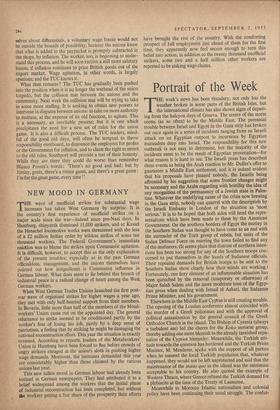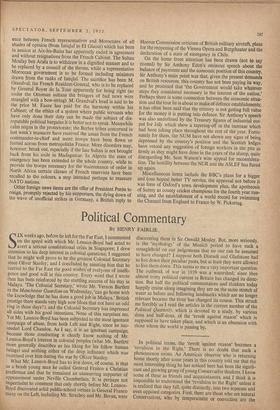Portrait of the Week
THE week's news has been thundery; not only has the weather broken in some parts of the British Isles, but the international climate has also shown signs of depart- ing from the halcyon days of Geneva. The centre of the storm seems (as 'so often) to be the Middle East. The perennial trouble between Israel and Egypt in the Gaza strip has broken out once again in a series of incidents ranging from an Israeli attack on an Egyptian outpost to incursions by Egyptian marauders deep into Israel. The responsibility for this new outbreak is not easy to determine, but the majority of the incidents seem to be the result of Egyptian provocation—for what reason it is bard to see. The Israeli press has described these events as being the Arab reaction to Mr. Dulles's offer to guarantee a Middle East settlement, and it is indeed evident that his proposals have pleased nobody, the Israelis being affronted by his suggestion that some frontier changes might be necessary and the Arabs regarding with hostility the idea of any recognition of the permanency of a Jewish state in Pales- tine. Whatever the undetlying cause of the crisis now brewing in the Gaza strip, nobody can quarrel with the descriptio'n by the Israeli Embassy in London of the situation as 'most serious.' It is to be hoped that both sides will heed the repre- sentations which have been made to them by the American Government. On the southern borders of Egypt the mutiny in the Southern Sudan was thought to have come to an end with the surrender of the Torit group of rebels, but units of the Sudan Defence Force on entering the town failed to find any of the mutineers. (It seems plain that distrust of northern inten- tions has been too strong for any of the Southern troops con- cerned to put themselves in the hands of Sudanese officials. Their repeated demands for British troops to be sent to the Southern Sudan show clearly how their minds are working.) Fortunately, one fiery element of an inflammable situation has been quenched by the removal (temporary or otherwise) of Major Salah Salem and the more moderate tone 'of the Egyp- tian press when dealing with Ismail el Azhari, the Sudanese Prime Minister, and his government.
Elsewhere in the Middle East Cyprus is still creating trouble. The opening of the London conference almost coincided with the murder of a Greek policeman and with the approval of political assassination by the general council of the Greek Orthodox Church in the island. The Bishop of Cyrenia (always a turbulent see) led the cheers for the Eoko terrorist group, thereby adding one more blemish to the already tarnished repu- tation of the Cypriot hierarchy. Meanwhile, the Turkish atti- tude towards the question has hardened and the Turkish Prime Minister, M. Menderes, spoke with the support of all parties when he assured the local Turkish population that, whatever happened, they would not be left unprotected and said that the maintenance of the status quo in the island was the minimum acceptable to his country. He also quoted the example of Western Thrace, where Greece refused the Turkish demand for a plebiscite at the time of the Treaty of Lausanne.
Meanwhile in Morocco Islamic nationalism and colonial policy have been continuing their usual struggle. The confer- ence between French representatives and Moroccans of all shades of opinion (from Istiqlal to El Glaoui) which has been in session at Aix-les-Bains has apparently ended in agreement and without resignations from the French Cabinet. The Sultan Moulay ben Arafa is to withdraw in a dignified manner and to be replaced by a council of the throne, while a representative Moroccan government is to be formed including ministers drawn from the ranks of Istiqlal. The sacrifice has been M. Grandval, the French Resident-General, who is to be replaced by General Boyer de la Tour apparently for being right (so under the Ottoman sultans the bringers of bad news were strangled with a bow-string). M. Grandval's head is said to be the price M. Faure has paid for the harmony within his Cabinet; of the ethics of a system where public servants who have only done their duty can be made the subject of dis- reputable political bargains it is better not to speak. Meanwhile calm reigns in the protectorate; the Berber tribes concerned in last week's massacre have received the aman from the French commander-in-chief and more troops have been flown or ferried across from metropolitan France. More disorders may, however, break out, especially if the late Sultan is not brought back from his exile in Madagascar. In Algeria the state of emergency has been extended to the whole country, while to provide the troops necessary for the maintenance of order in North Africa certain classes of French reservists have been recalled to the colours, a step intended perhaps to reassure NATO nations.
Other foreign news items are the offer of President Peron to resign, promptly rejected by his supporters, the dying down of the wave of unofficial strikes in Germany, a British reply to Hoover Commission criticism of British military aircraft, plans for the reopening of the Vienna Opera and Burgtheater and the declaration of a state of emergency in Chile.
On the home front attention has been drawn (not to say riveted) by Sir Anthony Eden's ominous speech about the balance of payments and the economic position of this country. Sir Anthony's main point was that, given the present demands on British resources, this country has not been paying its way. and he promised that 'the Government would take whatever steps they considered necessary in the interest of the nation.' Perhaps there is some connection between the economic situa- tion and the tour he is about to make of defence establishments; it has often been said that the country is not getting full value for the money it is putting into defence. Sir Anthony's speech was also underlined by the Treasury figures of industrial out- put for July which show a tapering-off in the increase which had been taking place throughout the rest of the year. Fortu- nately for them, the NUM have not shown any signs of being depressed by the country's position and the Scottish lodges have vetoed any suggestion of foreign workers in the pits as firmly as they might have done in the years of the slump, quite disregarding Mr. Sam Watson's wise appeal for reconsidera- tion. The hostility between the NUR and the ASLEF has flared up again.
Miscellaneous items include the BBC's plans for a bigger and (one hopes) better TV service, the approval not before it was time of Oxford's town development plan, the apotheosis of Surrey as county cricket champions for the fourth year run- ning, and the establishment of a world record for swimming the Channel from England to France by W. Pickering.



































 Previous page
Previous page